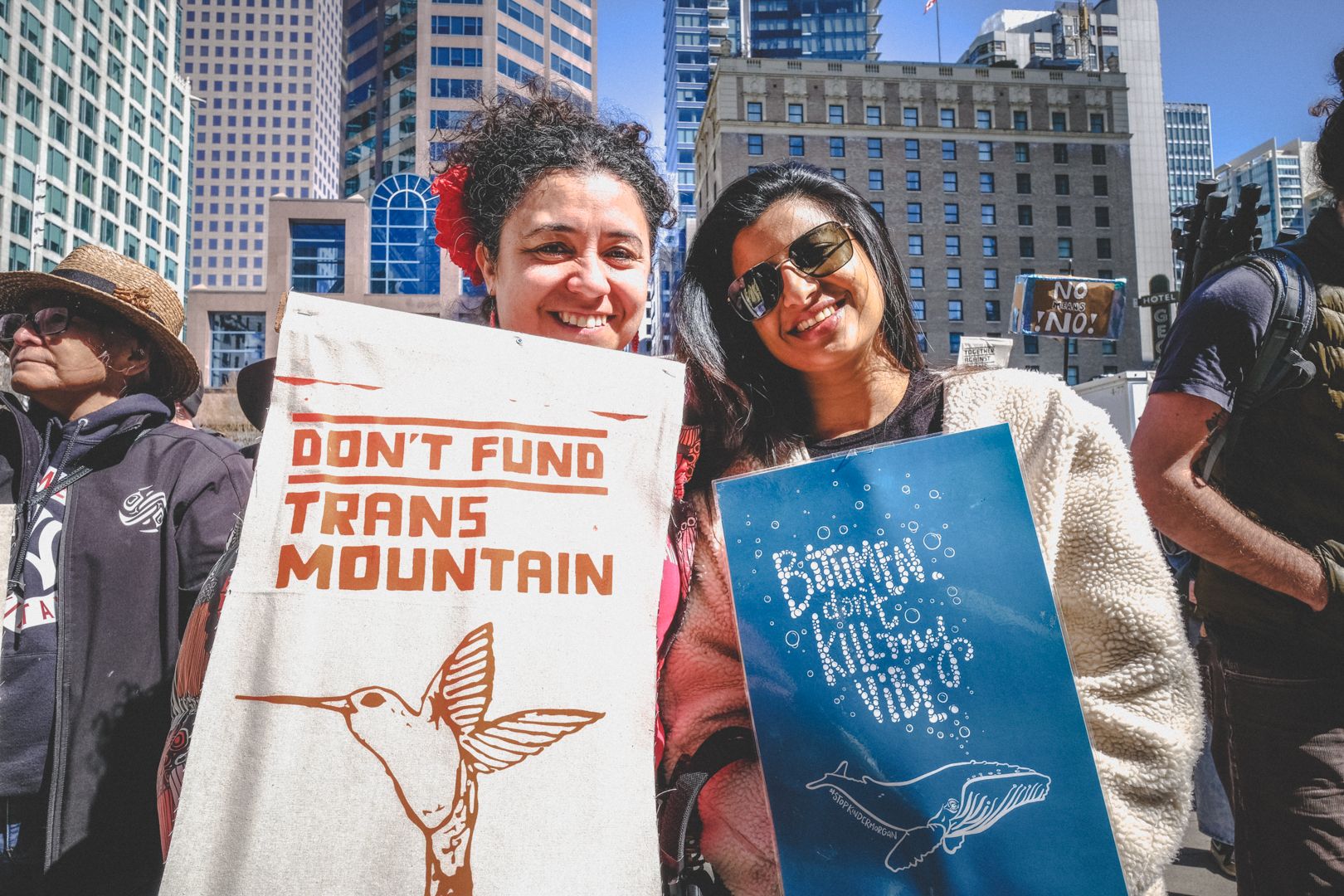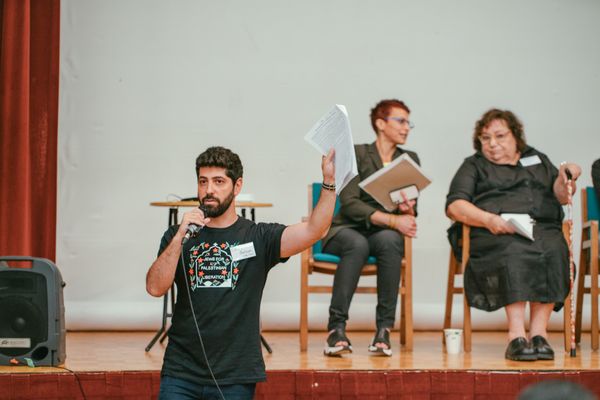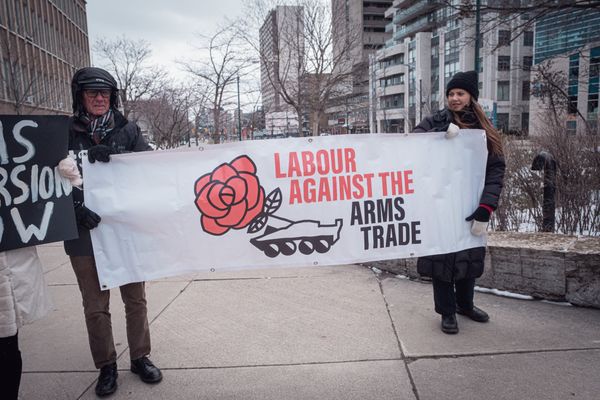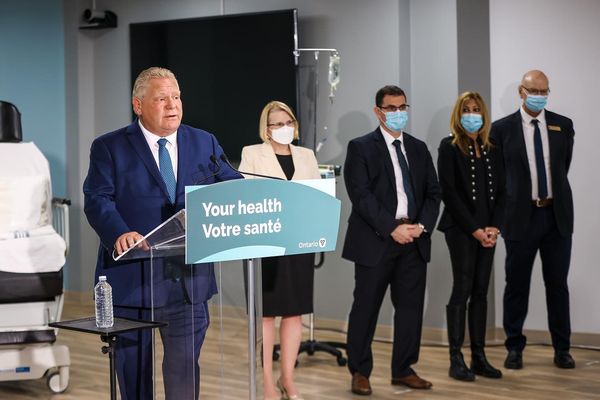By Alex Cosh
When B.C. Premier John Horgan announced he was stepping down and that the B.C. NDP would have a leadership race to replace him, Anjali Appadurai was – largely for personal reasons – reluctant to enter such a high-profile contest.
A former federal NDP candidate in the Vancouver Granville riding, where she placed a close second in the 2021 election, Appadurai said her entry into the leadership race followed a recent Peace and Unity Summit on Wet’suwet’en and Gitxsan territory, where hereditary chiefs and their allies oppose the construction of the Coastal GasLink liquefied natural gas (LNG) pipeline.
The July gathering, Appadurai told The Maple, reminded her of the “cost of prioritizing industry.” The Coastal GasLink project garnered national attention last fall after the B.C. government authorized a militarized RCMP invasion of Wet’suwet’en territory to enforce an injunction, at a time when catastrophic floods – driven by the fossil fuel-driven climate crisis – devastated other parts of the province.
Appadurai explained that listening to the hereditary chiefs and young people from across the province share their strongly stated opposition was part of her inspiration in deciding to throw her hat into the ring.
“I think there's a whole generation of young people who don't feel a lot of hope in the electoral process right now,” she said. “Sometimes you need to jam the gears a little bit so that people are reminded that there is another way; it's not business as usual.”
Appadurai, who currently works as director of campaigns for the Climate Emergency Unit, has never held public office, but ran a strong campaign in Vancouver Granville, increasing her party’s vote share in the riding by more than 20 per cent, and finishing just over 400 votes behind the Liberal Party’s Taleeb Noormohamed.
Eighteen-to-24 year olds have consistently been the lowest turnout age group in federal elections over the past decade, with the percentage who cast a ballot in 2021 dropping two per cent from 2019. Thirty-six percent in that age group said they did not vote for political reasons.
While Elections Canada does not publish riding-by-riding voter turnout by age, Vancouver Granville’s median age is 40, with a significant population of young renters, many of whom enthusiastically campaigned for Appadurai. She had no plans to step into provincial politics after the 2021 election, and was instead focused on building organizational capacity in her federal riding.
“The type of insurgent campaign I ran has a much better, bigger impact when you're able to build up the community infrastructure,” she explained. “When there are more of us running, the impact will be even more powerful.”
It turned out that her federal campaign provided significant momentum for her provincial run too. During a recent climate justice community meeting, Appadurai’s team raised $40,000 in just five minutes, easily covering the B.C. NDP leadership contest’s entry fee.
“People were so excited, and so I feel like I received a mandate from the community during that meeting,” she explained. “That's when I decided to step up and answer that call.”
She hopes to attract more young people concerned about their future in the face of the climate crisis to her leadership campaign.
“There's a much broader swath of people who also feel represented by this campaign, but it's really young people who I feel are on the forefront of understanding the climate issue,” said Appadurai.
An Uphill Battle
Appadurai faces a steep challenge in competing against the leadership contest’s only other candidate, David Eby. The B.C. attorney general and minister responsible for housing has the support of 48 B.C. NDP MLAs, and 44 per cent of NDP voters – although 50 per cent said they are undecided.
That polling data was taken before Appadurai announced her candidacy. Even so, the insurgent candidate is well aware that beating Eby would be an enormous upset.
“The race for the leadership is one thing, but building up an excited, energized and hopeful generation of new energy to start kicking on those riding-level battles, and entering caucus themselves, that's equally, if not more, important,” Appadurai explained. “I think this is an opportunity for us to build up our organizing muscle.”
She noted her candidacy makes the leadership race competitive, and has the potential to bring back NDP members who cancelled their party memberships in disgust over the government's handling of issues like the Wet’suwet’en land defenders, the Fairy Creek old-growth logging protests and the drug-poisoning crisis.
Appadurai acknowledges that her criticisms of the B.C. NDP’s record in government come from someone who has never held elected office. “It's very easy for me to give some of these policy prescriptions,” she said.
Still, Appadurai is running with a plan to fundamentally change the government’s priorities and policy framework. “I'd like to see a reprioritization of how the government approaches decision making around industry in the province, and corporate influence,” she explained.
“Over the past couple of years, we've all taken a hit, from health and from lack of housing, and we're all feeling the squeeze right now from these intersecting crises.”
Appadurai said her approach centres on applying considerations for future generations, Indigenous sovereignty and ecological sustainability to government decision-making. When these priorities guide policy, she explained, large resource extraction projects “become far more costly than they are beneficial.”
“We're in a place where we have decades of policy decisions that have led us to an economy that's entirely dependent on extractive industries,” said Appadurai. “There's no easy policy prescription that I can speak to, except that we urgently need a strong government commitment to a deep investment in an immediate transition to a renewable-energy economy.”
These investments, she continued, would be used to create renewable-energy jobs, training programs and a managed decline of the fossil fuel industry. “There needs to be the political will and courage to put real mandates on the industry rather than incentives and rewards,” she added.
This approach of reining in corporate influence applies to her other policy priorities as well, particularly as costs for basic goods like gas and groceries have soared while corporate profits across the country have, in many cases, continued to rise.
“What we're allowing is a system of wealth accumulation that's actually drawing money away from regular people, and it's putting our most vulnerable at acute risk,” said Appadurai.
Underinvesting in adequate housing and social programs, she continued, has put vulnerable people in harm’s way, as shown by last year’s record-breaking heat dome that killed more than 600 people and caused a fire that destroyed the village of Lytton.
“All of that comes to bear and it creates deadly consequences,” she said.
What if?
Although Appadurai winning the B.C. NDP leadership would surely defy the odds, election upsets mounted by insurgent progressives are hardly unheard of in recent years: See Alexandria Ocasio-Cortez in the United States and Jeremy Corbyn’s 2015 leadership victory in the United Kingdom.
However, those candidates faced incredibly hostile responses from within their respective parties. I asked Appadurai if she is concerned about potentially facing an unfriendly B.C. NDP caucus if she ultimately wins.
“The support I have sought has not been from within the caucus,” she acknowledged. “I know that there are excellent people within the caucus who agree with my values, and I'm confident that there would be support if we were to take government.”
Still, “I'm under no illusions that this would be something that would not be welcomed by a lot of people [in caucus] and maybe the majority of people within the party.”
For the time being, Appadurai is focused on setting out what she sees as a “truly progressive vision” for the NDP.
“I'm thinking one step at a time in this campaign and focused on telling the story of why this campaign is necessary,” she said. “I would very much look forward to working with caucus members who are aligned with that vision.”
Other competitors have until Oct. 4 to enter the race, with the winner scheduled to be announced on Dec. 3.
Alex Cosh is the managing editor of The Maple.
Edited by John Young.







